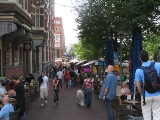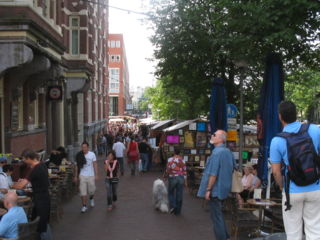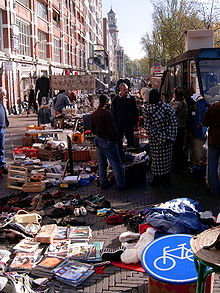
Waterlooplein
Encyclopedia


Amsterdam
Amsterdam is the largest city and the capital of the Netherlands. The current position of Amsterdam as capital city of the Kingdom of the Netherlands is governed by the constitution of August 24, 1815 and its successors. Amsterdam has a population of 783,364 within city limits, an urban population...
, The Netherlands, near the Amstel
Amstel
The Amstel is a river in the Netherlands which runs through the city of Amsterdam. The river's name is derived from Aeme stelle, old Dutch for "area abounding with water"....
river. The daily flea market
Flea market
A flea market or swap meet is a type of bazaar where inexpensive or secondhand goods are sold or bartered. It may be indoors, such as in a warehouse or school gymnasium; or it may be outdoors, such as in a field or under a tent...
on the square is popular with tourists. The Stopera
Stopera
The Stopera is a building complex in Amsterdam, The Netherlands, housing both the city hall of Amsterdam and the Muziektheater, the principal opera house in Amsterdam and the home of De Nederlandse Opera, Het Nationale Ballet, and the Holland Symfonia....
city hall and opera building and the Mozes en Aäronkerk church are at Waterlooplein.
Waterlooplein was created in 1882 when the Leprozengracht and Houtgracht canals were filled in. The square is named after the Battle of Waterloo
Battle of Waterloo
The Battle of Waterloo was fought on Sunday 18 June 1815 near Waterloo in present-day Belgium, then part of the United Kingdom of the Netherlands...
in 1815.
The square became a marketplace when the city government decided that the Jewish merchants in the nearby Jodenbreestraat
Jodenbreestraat
The Jodenbreestraat is a street in the centre of Amsterdam, The Netherlands. The street runs from the Sint Antoniesluis sluice gates to the Mr. Visserplein traffic circle...
and Sint Antoniebreestraat had to move their stalls to the square. The Waterlooplein became a daily market (except on Saturdays, the Jewish sabbath
Shabbat
Shabbat is the seventh day of the Jewish week and a day of rest in Judaism. Shabbat is observed from a few minutes before sunset on Friday evening until a few minutes after when one would expect to be able to see three stars in the sky on Saturday night. The exact times, therefore, differ from...
) in 1893.
During World War II
World War II
World War II, or the Second World War , was a global conflict lasting from 1939 to 1945, involving most of the world's nations—including all of the great powers—eventually forming two opposing military alliances: the Allies and the Axis...
the Jewish quarter was emptied of its residents as the Nazis rounded them up and sent them to concentration camps. The Waterlooplein market had disappeared by 1941. After the war, the Jewish quarter was left deserted, and the Waterlooplein market became a flea market. The market currently has some 300 stalls and is open every day except Sunday.
In 2005, the Jewish Historical Museum
Joods Historisch Museum
The Joods Historisch Museum is a museum in Amsterdam dedicated to Jewish history, culture and religion, in the Netherlands and worldwide. It is the only museum in the Netherlands dedicated to Jewish history...
presented an exhibition of paintings and photographs depicting Waterlooplein. The exhibition included works by Wolfgang Suschitzky
Wolfgang Suschitzky
Wolf Suschitzky BSC , is a cinematographer and photographer.Suschitzky was born above his family’s socialist bookshop. In an interview at the age of 95 in September 2007, he recalled boyhood memories of the excitement that greeted the Russian Revolution in 1917...
, Max Liebermann
Max Liebermann
Max Liebermann was a German-Jewish painter and printmaker best known for his etching and lithography.-Biography:...
and Oskar Kokoschka
Oskar Kokoschka
Oskar Kokoschka was an Austrian artist, poet and playwright best known for his intense expressionistic portraits and landscapes.-Biography:...
.
Waterlooplein is a stop on the Amsterdam metro
Amsterdam Metro
The Amsterdam Metro is a mixed rapid transit and light rail system in Amsterdam, and its surrounding municipalities Amstelveen, Diemen, and Ouder-Amstel in the Netherlands. The network is owned by the city of Amsterdam and operated by the Gemeentelijk Vervoerbedrijf, the company that also operates...
line. Tram lines 9 and 14 and the Museumboot water taxi also stop at Waterlooplein. There is a taxi stand and parking garage.
"Oh Waterlooplein" (to the tune of Joe Dassin
Joe Dassin
Joseph Ira Dassin , more commonly known as Joe Dassin, was an American singer-songwriter best known for his French songs of the 1960s and 1970s.-Biography:...
's Les Champs Élysées) is a song made popular by Dutch performers Johnny Kraaykamp and Rijk de Gooyer
Rijk de Gooyer
Rijk de Gooyer was a Dutch Golden Calf- winning actor, writer, comedian and singer. From the 1950s until the early 1970s, he became well known in The Netherlands as part of a comic duo with John Kraaijkamp, Sr...
.
Near Waterlooplein
Well-known sights near Waterlooplein include:- The Blauwbrug and Magere BrugMagere BrugThe Magere Brug is a bridge over the river Amstel in the city centre of Amsterdam. It connects the banks of the river at Kerkstraat , between Keizersgracht and Prinsengracht ....
bridges across the AmstelAmstelThe Amstel is a river in the Netherlands which runs through the city of Amsterdam. The river's name is derived from Aeme stelle, old Dutch for "area abounding with water"....
river - The Rembrandt House MuseumRembrandt House MuseumThe Rembrandt House Museum is a house in Jodenbreestraat in Amsterdam, Netherlands, where Rembrandt lived and painted for a number of years. It is now a museum...
- The Portuguese Synagogue
- The Jewish Historical MuseumJoods Historisch MuseumThe Joods Historisch Museum is a museum in Amsterdam dedicated to Jewish history, culture and religion, in the Netherlands and worldwide. It is the only museum in the Netherlands dedicated to Jewish history...
- The Hermitage AmsterdamHermitage AmsterdamHermitage Amsterdam is a dependency of the Hermitage Museum of Saint Petersburg on the Amstel river in Amsterdam. The dependency is located at the former Amstelhof, a classical style building from 1681. The dependency has been displaying small exhibitions in a side building next to the Amstelhof...
museum

